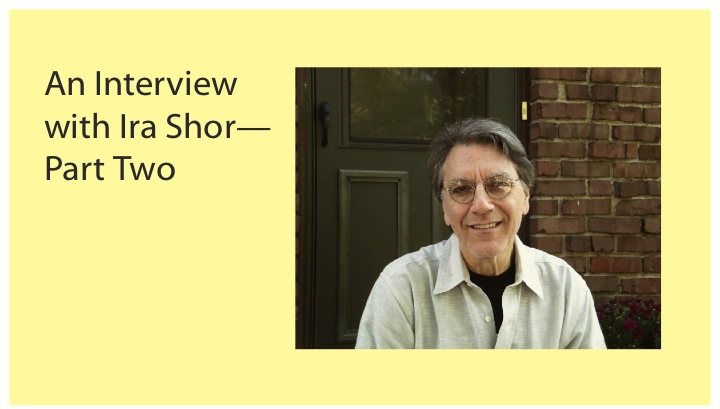Lépjen offline állapotba az Player FM alkalmazással!
Episode 31: An Interview with Ira Shor—Part Two
Manage episode 166486478 series 70161

Original image found in: http://urbaned.commons.gc.cuny.edu/files/2014/02/ira-shor.jpeg
In any event, first [thing] we have to make contact with is the situation that we are entering and what kind of context we are teaching in, and for. And we have to then educate ourselves into the context.
In addition, the other thing is, the political conditions not only change from place to place; that is, some places are more open to allowing teachers to experiment, some places are very rigid and very punitive and repressive—so that we had to adjust to the political climate or the political profile around us. But that political climate was not only a function of place of where we were teaching, it is also a function of time.
Part two of the interview focuses on updates to critical pedagogy, including some of Shor’s more recent experiments in the classroom. We also talk a lot about movement work, about the pedagogies of movements, about the role that educators play and might play, and about what Shor has been doing inside and outside of formal academic institutions.
Once again, we let the tape run and give you a largely unedited interview. We have in mind an audience who is familiar with Shor and critical pedagogy but who may be interested in some of the personal details and specific points that Shor raises here that may not be available elsewhere.
And once again, a tiny chorus of Zebra finches make up the background noise for our conversation.
We hope you enjoy it.
http://thisrhetoricallife.syr.edu/wp-content/uploads/2016/05/This-Rhetorical-Life-Episode-31-Ira-Shor-1.mp3For a full transcript of the episode, click on the following link: Episode 30 Transcript.
Music sampled in this episode is “Night Owl” from Broke For Free.
10 epizódok
Manage episode 166486478 series 70161

Original image found in: http://urbaned.commons.gc.cuny.edu/files/2014/02/ira-shor.jpeg
In any event, first [thing] we have to make contact with is the situation that we are entering and what kind of context we are teaching in, and for. And we have to then educate ourselves into the context.
In addition, the other thing is, the political conditions not only change from place to place; that is, some places are more open to allowing teachers to experiment, some places are very rigid and very punitive and repressive—so that we had to adjust to the political climate or the political profile around us. But that political climate was not only a function of place of where we were teaching, it is also a function of time.
Part two of the interview focuses on updates to critical pedagogy, including some of Shor’s more recent experiments in the classroom. We also talk a lot about movement work, about the pedagogies of movements, about the role that educators play and might play, and about what Shor has been doing inside and outside of formal academic institutions.
Once again, we let the tape run and give you a largely unedited interview. We have in mind an audience who is familiar with Shor and critical pedagogy but who may be interested in some of the personal details and specific points that Shor raises here that may not be available elsewhere.
And once again, a tiny chorus of Zebra finches make up the background noise for our conversation.
We hope you enjoy it.
http://thisrhetoricallife.syr.edu/wp-content/uploads/2016/05/This-Rhetorical-Life-Episode-31-Ira-Shor-1.mp3For a full transcript of the episode, click on the following link: Episode 30 Transcript.
Music sampled in this episode is “Night Owl” from Broke For Free.
10 epizódok
所有剧集
×Üdvözlünk a Player FM-nél!
A Player FM lejátszó az internetet böngészi a kiváló minőségű podcastok után, hogy ön élvezhesse azokat. Ez a legjobb podcast-alkalmazás, Androidon, iPhone-on és a weben is működik. Jelentkezzen be az feliratkozások szinkronizálásához az eszközök között.




